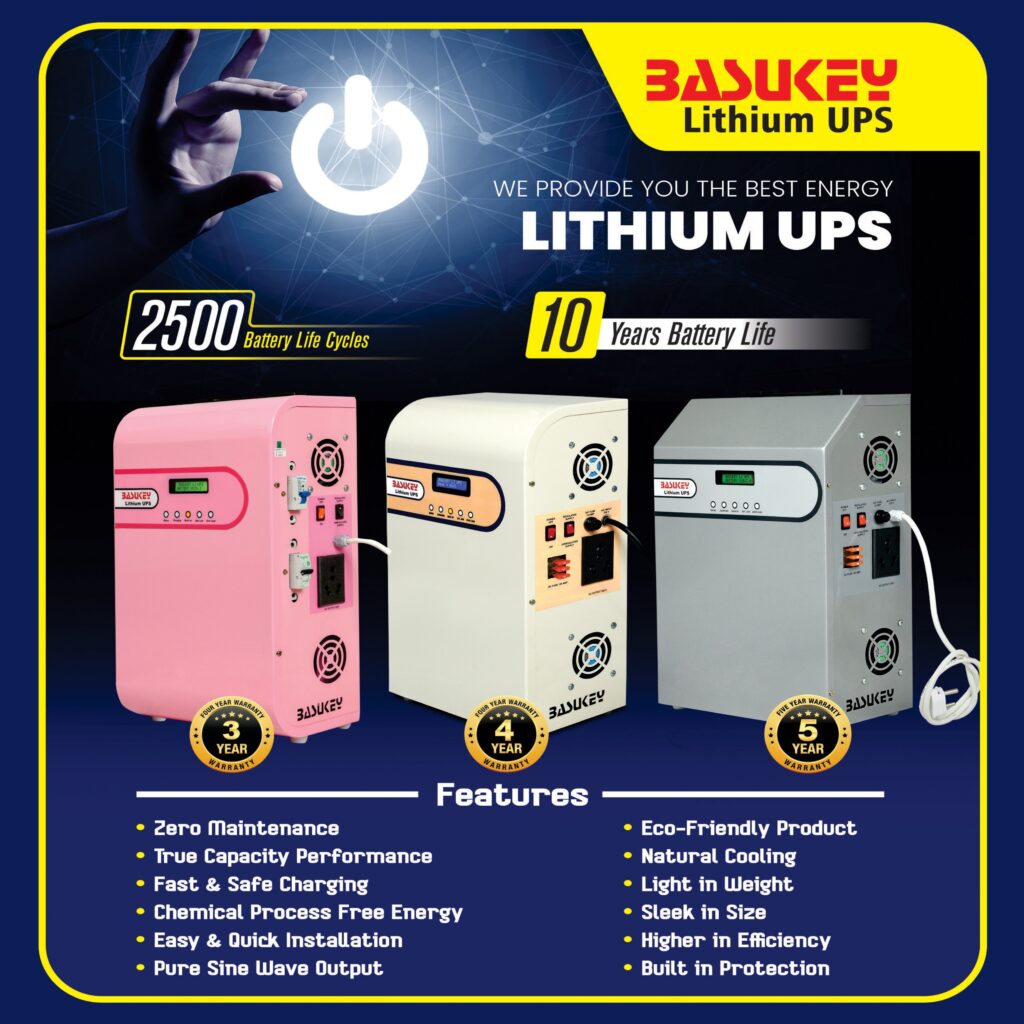The Evolution of Power Backup: Basukey Lithium UPS Leading the Charge
The Evolution of Power Backup: Basukey Lithium UPS Leading the Charge. Reliable power is the backbone of modern industries, from data centers and financial institutions to healthcare facilities and manufacturing plants. As businesses and households become increasingly dependent on uninterrupted energy, Uninterruptible Power Supply (UPS) batteries have evolved to meet the growing demands for efficiency, longevity, and sustainability. This evolution has been driven by advancements in battery technology, energy management systems, and smart grid integration, with lithium-based UPS solutions leading the charge.
The Shift from Traditional to Advanced UPS Batteries
Historically, lead-acid batteries dominated the UPS industry due to their availability and low initial cost. However, their short lifespan, long recharge times, and high maintenance requirements have paved the way for more advanced solutions like lithium-ion batteries.
| Feature | Lead-Acid UPS | Lithium UPS |
|---|---|---|
| Lifespan | 3–5 years | 10–15 years |
| Efficiency | 70%–80% | 95%+ |
| Charge Time | 8–12 hours | 2–4 hours |
| Depth of Discharge (DoD) | 50% | 80%–100% |
| Maintenance | High | Low |
| Weight & Size | Heavy & bulky | Compact & lightweight |
The transition to lithium-based UPS systems reflects a broader shift toward higher efficiency, longer durability, and smart energy management.
Key Innovations Driving UPS Battery Evolution
1. Lithium-Ion Technology for Superior Performance
Lithium UPS systems provide:
- Faster charging cycles for rapid power recovery
- Higher energy density, reducing space requirements
- Consistent voltage output, improving the stability of critical operations

2. Smart Battery Management Systems (BMS)
Modern UPS solutions integrate AI-driven Battery Management Systems (BMS) that enable:
- Real-time monitoring of power usage and battery health
- Automated performance optimization to extend battery lifespan
- Predictive maintenance alerts, minimizing unexpected failures
3. Renewable Energy Integration
With the global push toward sustainability, UPS batteries are now designed to seamlessly integrate with solar and wind power systems, reducing reliance on fossil fuel-based grids.
4. Scalable & Modular UPS Solutions
Businesses and data centers require customizable power solutions. Advanced UPS systems offer modular architectures, allowing companies to scale backup capacity based on demand.
Industries Leading the Adoption of Lithium UPS Technology
1. Data Centers & IT Infrastructure
With zero tolerance for downtime, data centers rely on high-efficiency lithium UPS systems to maintain continuous operations and protect critical data.
2. Financial Services & Banking
Uninterrupted transactions and real-time trading platforms depend on stable, instant power backup.
3. Healthcare & Pharmaceuticals
Hospitals and research labs require uninterrupted power for life-saving equipment and sensitive medical processes.
4. Industrial Automation & Manufacturing
UPS systems ensure smooth production workflows and prevent costly disruptions due to power failures.
5. Telecommunications & Smart Cities
From 5G networks to smart grid infrastructures, lithium-based UPS systems support critical communication technologies worldwide.
The Future of UPS Batteries: What’s Next?
As power demands increase and sustainability becomes a priority, the future of UPS batteries will focus on:
- Ultra-fast charging technologies, reducing downtime between power cycles
- AI-driven energy management, optimizing power usage in real time
- Recyclable and eco-friendly battery materials, minimizing environmental impact
- Advanced grid storage solutions, enabling businesses to store and utilize power more efficiently
Conclusion: Lithium UPS Batteries at the Forefront of Power Backup Evolution
The evolution of UPS battery technology has transformed power backup from a reactive necessity to a proactive energy strategy. With lithium-based UPS systems offering superior efficiency, reliability, and scalability, businesses can future-proof their power infrastructure while reducing costs and enhancing sustainability. As industries continue to prioritize energy resilience, lithium UPS solutions will remain at the forefront, leading the charge toward smarter, more efficient power backup systems.
